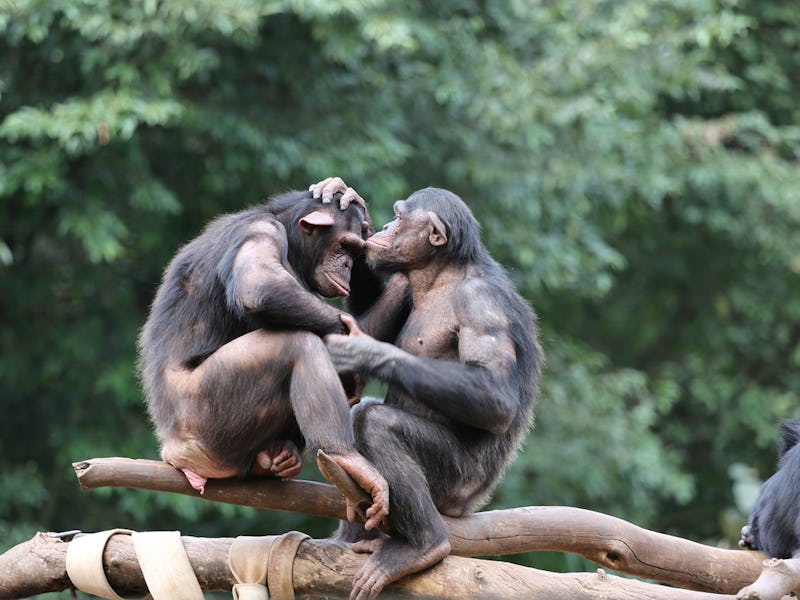Urine-Sniffing Chimpanzees Demonstrate the Value of Smelling Your Date
"We tend to downplay the role of smell in our own lives."

Dogs can simply turn their noses to the wind or toward a fire hydrant to determine who was there before, but humans have been left out of the sniffing social circle. Though we’re resigned to our fate as second-class sniffers who can’t understand the chemical language of odor, new research on chimpanzees in Proceedings of the Royal Society B suggests that we might be able to learn more about one another from smell than we previously believed.
For a long time, says anthropologist and study author Joanna Setchell, Ph.D., of Durham University, the general consensus was that smell wasn’t a huge factor in the social lives of great apes, a family that includes humans. This was based on the fact that great apes lack a fully functional vomeronasal organ (VNO), an extension of the brain in mammals that communicate using chemical traces in odor, like dogs and mice. But even though we lack this crucial social-sniffing organ, Setchel’s study, published Wednesday, shows that chimps react differently to odors produced by relatives and by strangers, indicating that they still use scent to learn important details about one another. And by virtue of our evolutionary link to chimps, we might too.
“Sometime ago people thought that if you didn’t have a VNO then you couldn’t react to social odors,” Setchell tells Inverse. “ But even without a VNO you can react to and pick up on social cues.”
Chimpanzees, like humans, are social creatures. These results suggest that smell might play a role in how they socialize.
For her study population of 88 chimpanzees at Germany’s Leipzig Zoo, a sniff of urine was enough for an individual to tell who was related to them and who wasn’t. Setchell found that chimpanzees tend to sniff urine samples from unfamiliar “outgroup” individuals longer than those from familiar, related ones. Chimps clearly spent the most time sniffing urine samples from completely foreign individuals, but an interesting pattern of sniffing behavior emerged among in-group sniffers: The more closely related an individual was to the urine donor, the longer it spent sniffing the sample.
The fact that chimpanzees react differently to scents from their relatives and strangers is evidence that they glean social cues from smells, says Setchell. In the wild, she adds, chimpanzees are savvy when it comes to choosing partners and tend to avoid those who were genetically similar to themselves, presumably to prevent the ill effects of incestuous relationships. Setchell’s study did not take place in a mating context, but her observations are most likely still relevant to those settings.
“If chimpanzees can tell the difference between an related animal and an unrelated animal then theoretically they should avoid mating with an unrelated animal,” Setchell says. “And also we know that’s what they do when you look at the outcomes of mating. What our experiment shows is that they could be using olfaction to do that.”
The fact that Setchell was able to show that chimpanzees can pick up on social cues can tell us a lot about how humans use scent cues to glean information about people. Dating services have tried to capitalize on this idea by using scent to pair people up, providing pre-worn T-shirts from potential suitors for daters to choose from. The idea behind this matchmaking strategy is related to what Setchell observed in her chimps: Smell communicates something about an individual’s genetic qualities — we’re just not sure what it is.
“The results of those dating services are based on experiments showing that the can pick up on whether we are genetically similar or dissimilar to that T-shirt wearer. So what happens is if we’re dissimilar at a particular area of the genome we find the less disgusting than if we are more similar,” she says.
Satchell, however, isn’t completely sold on these services and says she’d be more convinced if they used another means beyond scent to test the strength of the match. Though her results suggest that olfaction does play a role in human social lives, she admits it isn’t always present in our conscious mind and thus its degree of influence on our partner choice remains unknown.
“We don’t go into a room and sniff substrates,” Stechell adds. “But we probably do react to smells in the room, it’s just we don’t react consciously. We’re just so used to only paying attention to what we react to consciously that we tend to downplay the role of smell in our own lives.”
So as compelling as the comparison is, her results might not be the silver bullet sniff-daters are looking for. But they are evidence that smell might be more important in human social life than we thought.